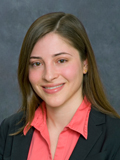 Wyn Furman graduated from Penn in 2009 with double majors in History and French. She is currently the Manager of Community Research for The San Diego Foundation, a community foundation that stewards philanthropic funds on behalf of the San Diego region. She recently shared her thoughts on her nonprofit career with Career Services.
Wyn Furman graduated from Penn in 2009 with double majors in History and French. She is currently the Manager of Community Research for The San Diego Foundation, a community foundation that stewards philanthropic funds on behalf of the San Diego region. She recently shared her thoughts on her nonprofit career with Career Services.
1. What got you interested in working for a nonprofit, and in the philanthropy field, specifically?
My interest in working in the nonprofit sector developed when I realized how much I had benefited from the generosity of others—particularly in receiving my education—which made me want to “give back” through my work. Arriving at Philanthropy was a happy accident. In our field, we feel that people don’t graduate from college hoping to enter our line of work, probably due to a lack of familiarity with this part of the nonprofit sector. As a result, some of us are hoping to introduce more intentionality to this career path by encouraging young talent to pursue philanthropy sooner.
2. Can you tell us a little bit about what you do and why it’s important?
Primarily, I serve our donors by helping them learn more about the issues and organizations to which they would like to dedicate funds. This includes providing background on challenges our region faces and even evaluating organizations’ financial position via tax records (which I enjoy, even though I was a history major!). In addition to the research component, I also solicit reports from organizations that describe the work they do with grants from our donors.
The aim of my work is to help donors feel more informed when deciding which organizations to support. This is great for the community because we help donors act on their passions. For instance, we’ve had donors who read about an organization in the paper call us to vet the organization before making a grant. In those cases, we’ve helped turn news coverage into dollars that support the community!
Our capacity for research is also among the services that help distinguish The Foundation from other institutions that manage charitable funds, like banks. Although my role is “behind the scenes,” I think it is important because I provide tools that help my colleagues strengthen their relationships with donors, and that help donors feel more connected to the community. It’s a win-win that ultimately benefits our region.
3. What are the different hats you’ve worn since joining the San Diego Foundation?
I started by helping to coordinate Our Greater San Diego Vision (www.OGSDV.org), a campaign that engaged 30,000 people across the greater San Diego region in planning for its long-term future. After more than a year and a half in that position, the bulk of the project was complete, so I chose to apply for the newly created position of Manager, Community Research.
This work draws on the regional knowledge I gained by working on Our Greater San Diego Vision. The nice thing about moving from a programmatic role (working on the Vision) to donor stewardship is that I have a solid understanding of the responsibilities and priorities of our two major areas of operation, and relationships throughout our organization. This has led to being engaged in some exciting projects and discussions in which I might not otherwise have been involved.
Continue reading “Using your liberal arts education for the common good – Q & A with Wyn Furman, CAS 2009”


